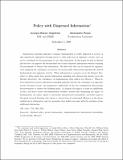| dc.contributor.author | Angeletos, George-Marios | |
| dc.contributor.author | Pavan, Alessandro | |
| dc.date.accessioned | 2010-03-03T19:56:56Z | |
| dc.date.available | 2010-03-03T19:56:56Z | |
| dc.date.issued | 2009-02 | |
| dc.identifier.issn | 1542-4766 | |
| dc.identifier.uri | http://hdl.handle.net/1721.1/52246 | |
| dc.description.abstract | Information regarding economic fundamentals is widely dispersed in society, is only imperfectly aggregated through prices or other indicators of aggregate activity, and cannot be centralized by the government or any other institution. In this paper we seek to identify policies that can improve the decentralized use of such dispersed information without requiring the government to observe this information. We show that this can be achieved by appropriately designing the contingency of taxation on ex post public information regarding the realized fundamentals and aggregate activity. When information is common (as in the Ramsey literature) or when agents have private information only about idiosyncratic shocks (as in the Mirrlees literature), the contingency on fundamentals alone suffices for efficiency. When instead agents have private information about aggregate shocks, the contingency on aggregate activity is crucial. An appropriate combination of the two contingencies permits the government to: (i) dampen the impact of noise and hence reduce non-fundamental volatility, without also dampening the impact of fundamentals; (ii) induce agents to internalize informational externalities, and hence improve the speed of social learning; (iii) restore a certain form of constrained efficiency in the decentralized use of information; and (iv) guarantee that welfare increases with the provision of any additional information. | en |
| dc.description.sponsorship | National Science Foundation | en |
| dc.language.iso | en_US | |
| dc.publisher | MIT Press | en |
| dc.relation.isversionof | http://dx.doi.org/10.1162/JEEA.2009.7.1.11 | en |
| dc.rights | Article is made available in accordance with the publisher's policy and may be subject to US copyright law. Please refer to the publisher's site for terms of use. | en |
| dc.source | George-Marios Angeletos | en |
| dc.title | Policy with Dispersed Information | en |
| dc.type | Article | en |
| dc.identifier.citation | Angeletos, George-Marios, and Alessandro Pavan. “Policy with Dispersed Information: Policy with Dispersed Information.” Journal of the European Economic Association 7.1 (2009): 11-60. | en |
| dc.contributor.department | Massachusetts Institute of Technology. Department of Economics | en_US |
| dc.contributor.approver | Angeletos, George-Marios | |
| dc.contributor.mitauthor | Angeletos, George-Marios | |
| dc.relation.journal | Journal of the European Economic Association | en |
| dc.eprint.version | Author's final manuscript | |
| dc.type.uri | http://purl.org/eprint/type/SubmittedJournalArticle | en |
| eprint.status | http://purl.org/eprint/status/PeerReviewed | en |
| dspace.orderedauthors | Angeletos, George-Marios; Pavan, Alessandro | en |
| dc.identifier.orcid | https://orcid.org/0000-0002-9269-5094 | |
| mit.license | PUBLISHER_POLICY | en |
| mit.metadata.status | Complete | |
